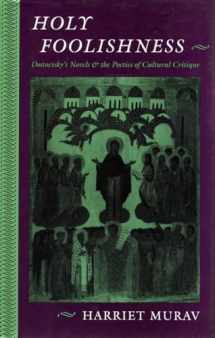
Holy Foolishness: Dostoevsky’s Novels and the Poetics of Cultural Critique
ISBN-13:
9780804720595
ISBN-10:
0804720592
Edition:
1
Author:
Harriet Murav
Publication date:
1993
Publisher:
Stanford University Press
Format:
Hardcover
228 pages
FREE US shipping
Book details
ISBN-13:
9780804720595
ISBN-10:
0804720592
Edition:
1
Author:
Harriet Murav
Publication date:
1993
Publisher:
Stanford University Press
Format:
Hardcover
228 pages
Summary
Holy Foolishness: Dostoevsky’s Novels and the Poetics of Cultural Critique (ISBN-13: 9780804720595 and ISBN-10: 0804720592), written by authors
Harriet Murav, was published by Stanford University Press in 1993.
With an overall rating of 4.2 stars, it's a notable title among other
books. You can easily purchase or rent Holy Foolishness: Dostoevsky’s Novels and the Poetics of Cultural Critique (Hardcover) from BooksRun,
along with many other new and used
books
and textbooks.
And, if you're looking to sell your copy, our current buyback offer is $0.31.
Description
This book examines the ways in which Dostoevsky's adoption and reinvention of the medieval Russian holy fool - in Russian Orthodoxy, a person who feigned madness or folly as an ascetic feat of self-humiliation - serves as a locus for a critique of his culture's increasing reliance on the scientific paradigms of Claude Bernard's physiology, and as a source of formal narrative innovation in his novels.The author first explores the paradoxical hagiography of the holy fool, whose saintly acts are disguised under the mask of demonic folly. She then traces the rise of medical science in the nineteenth century and the increasing authority of the new scientific models of human behavior, especially the all-important notion of "the normal and the pathological."The book then shifts to close readings of four of Dostoevsky's major novels - Crime and Punishment, The Idiot, The Devils, and The Brothers Karamazov - always keeping the double focus of cultural critique and formal innovation. The author examines how Dostoevsky develops a specific literary procedure that is itself "holy foolishness." That is, his novels in their structure and, in particular, in the voice of their narrators mislead, tempt, and "scandalize" the reader, much like the street theater of the medieval holy fool. This difficult relationship between reader and text is mirrored in what is represented in the text as the interaction between the holy fool and other characters.In its theoretical orientation, the book both builds from and criticizes Bakhtin's work on carnival. The author offers a less optimistic account, showing how in Dostoevsky carnival is more demonic than jubilant, particularly in The Devils, where carnival leads to a frightening chaos.


We would LOVE it if you could help us and other readers by reviewing the book
Book review

Congratulations! We have received your book review.
{user}
{createdAt}
by {truncated_author}


